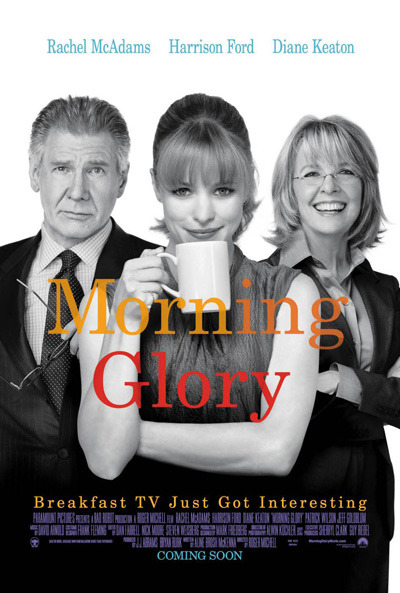They might not be popular among the KAIST student body, but every morning, breakfast television shows wake up the sleepy nation with the latest news from around the globe. In these daily morning shows – some of the most popular in America include NBC’s The Today Show and Good Morning America on ABC – news hosts broadcast live with stories for all demographic groups, from students to stay-at-home moms. Typically these shows are fun, casual and never limited to “hard” news. But how do these early birds produce such shows every morning before dawn? Morning Glory presents the bizarre behind-story of this industry and reminds us once again why breakfast television is so irresistible.

Rachel McAdams plays Becky Fuller, a workaholic TV producer recently fired from a news program in New Jersey. After losing her job, she starts over in the Big Apple as the new executive producer of a failing morning show Daybreak. As the fourteenth producer of Daybreak in eleven years, she is faced with the challenge of boosting viewer ratings to prevent the show from being cancelled. She brings in legendary TV journalist Mike Pomeroy (Harrison Ford) as a new anchor alongside Colleen Peck (Diane Keaton).
McAdams’ role is most certainly not that of the blonde queen bee from Mean Girls (though, I have to admit, she is better blonde). In Morning Glory, she’s perky, lively and smart – in fact, she may be the only character in the film that truly stands out. Even with the weak and scattered plot, McAdams’ vitality and down-to-earth personality keep the movie running.
What makes Morning Glory different from the typical, chick-flick romantic comedies is that the movie does not focus on the clichéd, bubbly romance between couples. Rather, what was most memorable about the movie were Becky’s commitment to her job and her will to succeed as a powerful, 21st century career woman. McAdams shows that maintaining a good balance between work, life and love is not easy. Nevertheless, she most certainly makes a good attempt at it and her sincerity shines through.
Aside from McAdams, Daybreak has a notable cast with Ford and Keaton as the show’s two main anchors. Ford plays Pomeroy, a character described as the “third worst person in the world” who insists on reporting only what he considers newsworthy. However, the reluctant ex-broadcast journalist is what shapes Becky as the perfect female character in this movie; Ford and McAdams’ grudges held against each other provide the crucial comic relief in rom com.
As Ford’s perfect-fit partner, Keaton plays a snarky former beauty queen. She is a veteran morning show host who, despite constant quarreling with her partner, smiles through the entire movie. Kudos to her – she even kisses a frog and raps with 50 Cent in the movie.
Unfortunately, neither of the two grouchy characters are developed to their full potential. From day one, the two anchors bicker over who should have the closing lines at the end of the show and begin to drag the movie down. Their performances are solid but mediocre at best.
Aline Brosh McKenna, the hit screenwriter of the 2006 movie The Devil Wears Prada, offers a similar screenplay in this film. Both movies offer a young female lead stuck in a workplace fiasco and struggling to make her way out. At times, Morning Glory seems like the sequel of The Devil Wears Prada with, of course, the breakfast television twist.
Morning Glory may not deserve a five-star-review but it certainly is worth watching. The captivating scenes of Bryant Park and breezy New York-style morning walks won’t let you change the channel, and the mellow background soundtracks make it even better. The merit of movies like Morning Glory is that they are filled with optimism and light-hearted laughter – which may be all we were really looking for in the first place.

